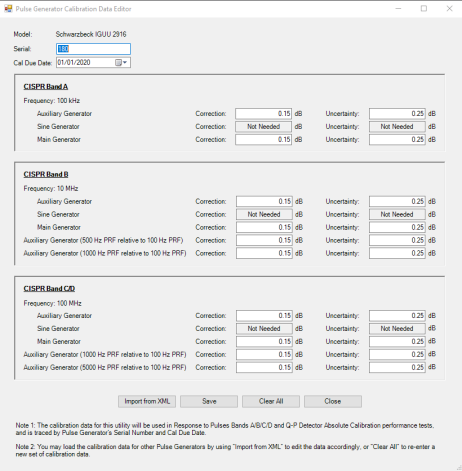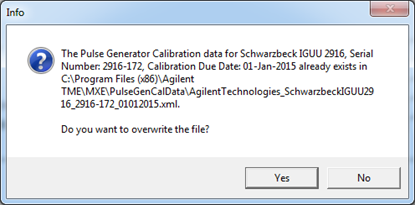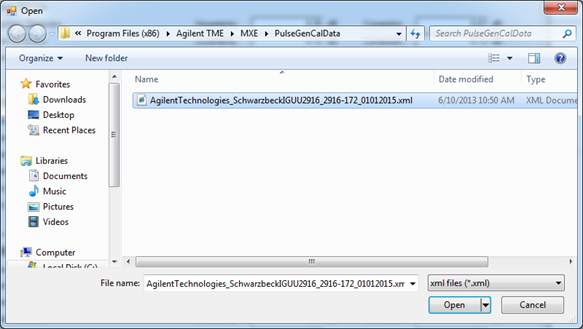Pulse Generator Calibration Data Editor Utility
This utility applies to the following models:
This utility is used to enter the Schwarzbeck IGUU Pulse Generator’s amplitude corrections and calibration uncertainties from the calibration report/certificate. This is required when choosing the preferred Test Solution 1 in Response to Pulses (Peak, RMS) Bands A/B/C/D and Q-P Detector Absolute Calibration performance tests. The amplitude corrections will be used to optimize the measured responses. The uncertainties will be used in calculating the measurement uncertainties which will give better margins and lower test uncertainties.
|

|
This utility was updated in the N7818A application E.10.00 release. This was necessary because the new pulse generator model Schwarzbeck IGUU 2918 does not have a sine wave generator. A PSG signal generator will now be used in place of the sine wave generator connections in the Response to Pulses (Peak, RMS) Bands A/B/C/D and Q-P Detector Absolute Calibration performance tests. This new setup will also be used with the (discontinued) Schwarzbeck IGUU 2916.
Because the sine wave generator is no longer used with either pulse generator model, that data is not required to be entered in this utility.
This also means that any calibration data files created with the previous utility will not be valid and will cause the Response to Pulses (Peak, RMS) Bands A/B/C/D and Q-P Detector Absolute Calibration performance tests to crash. A new file will need to be generated by running this utility.
|
The amplitude corrections and calibration uncertainties to be entered to this utility are as follows:
Main Generator
-
Correction and uncertainty at 100 kHz, 25 Hz PRF (Band A)
-
Correction and uncertainty at 10 MHz, 100 Hz PRF (Band B)
-
Correction and uncertainty at 100 MHz, 100 Hz PRF (Band C/D)
Auxiliary Generator
-
Correction and uncertainty at 100 kHz, 25 Hz PRF (Band A)
-
Correction and uncertainty at 10 MHz, 100 Hz PRF (Band B)
-
Correction and uncertainty at 100 MHz, 100 Hz PRF (Band C/D)
-
Correction and uncertainty at 500 Hz PRF relative to 100 Hz PRF (Band B)
-
Correction and uncertainty at 1000 Hz PRF relative to 100 Hz PRF (Band B)
-
Correction and uncertainty at 1000 Hz PRF relative to 100 Hz PRF (Band C/D)
-
Correction and uncertainty at 5000 Hz PRF relative to 100 Hz PRF (Band C/D)
Troubleshooting
You may get an GPIB connection error when using the IGUU 2918.

There is a known issue with certain versions of the Keysight IO Library not recognizing the Schwarzbeck IGUU 2918 pulse generator and therefore causing a GPIB connection failure. There are two work-around methods to correct this error. Refer to the Connecting GPIB Instruments section of Getting Started for more information.
For other troubleshooting tips for this test, click here.
Required Test Equipment
|
Test Equipment
|
Recommended Model Number
|
Alternative Model Number
|
|
CISPR Pulse Generator1, 2
|
Schwarzbeck IGUU 2918
|
Schwarzbeck IGUU 2916
|
- Both models of the Schwarzbeck pulse generator have fixed GPIB addresses which may require changing the GPIB address of conflicting equipment. Refer to the Connecting GPIB Test Instruments section of Getting Started.
-
The pulse generator will need to be mapped as test equipment in TME before executing this editor.
|
Pulse Generator Calibration Data Editor

Save
-
After entering the required data in the editor, click Save.
-
The pulse generator calibration data file will be saved to the following directory by default, with the file name format as shown below:
C:\Program Files (x86)\Agilent TME\MXE\PulseGenCalData\ AgilentTechnologies_SchwarzbeckIGUU2916_{SerialNumber}_{DDMMYYYY}.xml
-
If the file already existed in the directory, a warning message will be prompted as shown below. Click Yes to overwrite the file. (Refer to the next section for information about previously generated calibration data files.)

Import from XML
-
If there is a previous version of calibration data file saved, the user can choose to retrieve the file. Click Import from XML.
|

|
Calibration data files that were generated from N7818A applications prior to version E.10.00 are no longer valid. This utility was updated in the E.10.00 release with different values. Therefore any calibration data files created using earlier versions of the utility will cause the Response to Pulses (Peak, RMS) Bands A/B/C/D and Q-P Detector Absolute Calibration performance tests to crash. A new calibration data file will need to be generated by running this utility.
|
-
Select a pulse generator calibration data file to be retrieved.

-
Click Open and the pulse generator calibration data will be retrieved.






